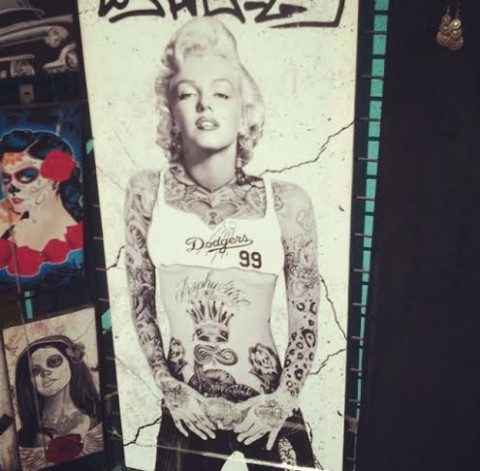How Marilyn Monroe's Image Became Public Property
The blonde bombshell is currently appearing posthumously in adverts for two rivalling fashion houses. What exactly does the most famous face in Hollywood mean to us?

David Beckham and Adidas. Beyoncé and Pepsi. Kerry Katona and Iceland.
These are all great, cultural icons of the 21st century - with loyal and strong associations to their respective brands.
But imagine if Becks suddenly pitched up drenched in Nike; Beyoncé declared that Coca Cola was the real thing; and Katona publicly vowed that, from now on, Asda was the only place for her lukewarm spring roll and bhaji selection platters.
It simply wouldn’t happen. For a start, Katona’s probably barred from Asda.
I couldn’t help but notice, though - snapping out of my turkey-induced haze for 30 seconds over the festive period - that the latest ‘Chanel No.5′ advert to grace our gogglebox features a very recognisable face indeed.
It’s April, 1960 - the commercial informs us, setting the scene - and then cuts away to a grainy montage of Marilyn Monroe, soundtracked by a crackly audio clip in which she posthumously expresses her love for the fragrance during an interview with then-editor of Marie Claire, Georges Belmont.
“You know, they ask me questions” she begins. “What do you wear to bed? A pyjama top? The bottoms of the pyjamas? A nightgown?”
“So I said, ‘Chanel No.5′, because it’s the truth. And yet, I don’t want to say ‘nude’ - but it’s the truth…”
Undoubtedly, it’s a clip which is worth it’s weight in gold to Coco and, erm, co - and one they’d probably have to stump up millions for in this day and age. It is testament to the luxury brand’s heritage and legacy - and I hope that the intern who was locked in the basement of Chanel HQ, trawling through fuzzy footage for 10,000 hours got the credit they deserved…or at the very least, was included in that day’s Pret a Manger run.
These days though, celebrity endorsements are big business - and the advert seems to have ruffled a few feathers in the fashion world, dahhhling.
Christian Dior, in particular, appear to have got a little hot under their 100% cashmere polo necks - and, in response, have recommissioned an advert from way back in 2011, featuring, yep, you guessed it, Marilyn Monroe. The ‘J’adore Dior’ commercial features Charlize Theron entering a dressing room, surrounded by CGI versions of Hollywood legends, such as Marlene Deitrich, Grace Kelly - and Monroe, who often wore dresses by the designer.
It’s a move which symbolises a telling retaliation from the French fashion house - but mainly, it serves to highlight the fact that, over five decades since Marilyn left us for the red carpet in the sky, she is more in-demand than ever before.
One Hollywood star; 50 years passed; advertising two products in direct competition of each other; for two boisterous occupiers of a narrow market space. It’s quite incredible.
Meanwhile, in the music industry, yesteryear Americana-peddler Lana Del Rey leans heavily on the retro connotations excuded by Monroe, and her style and persona pay tribute to the star - but the grumpy warbler has even gone one further, and featured the actress alongside Jesus Christ and Elvis Presley in her new short film, ‘Tropico’.
But Marilyn’s position in modern culture is not consigned to playing the prestige perfume pawn, or pop princess publicity puppet.
The likes of Absolut Vodka, Fiat, HSBC and Volkswagen have all sprinkled a little Monroe over their ad campaigns in recent years. So what is it about this controversial and tragic, albeit beautiful, woman, which makes her such a pin-up, 50 years after her death?
Despite the Hollywood glitz and glamour, fame and fortune which formed her adult years, she lived a far from glamorous life - and, for many years, that sparkling smile masked a dark and tragic story.
Modern day screen siren Megan Fox even went as far as to have her Marilyn Monroe portrait tattoo removed recently, amidst fears that the image was ‘attracting negative energy’. Explaining further, Fox said, “She wasn’t powerful at the time. She was an actress who wasn’t reliable, who almost wasn’t insurable…she had all the potential in the world, and it was squandered. I’m not interested in following in those footsteps.”
Los Angeles was home to Monroe for all of her 36 years - and the ‘City of Fallen Angels’ paid witness to both her dreams and her downfall.
Norma Jeane Mortensen was born in 1926 - entering stage left at LA County Hospital and moving between the Hollygrove orphanage and several foster families during her childhood - before entering into her first of three failed marriages aged just 16. Deep-rooted psychological issues, the result of alleged assault during her childhood, and insomnia, plagued her for years - and she went on to battle alcohol and prescription drugs addiction as she stumbled from relationship to relationship.
But, of course, her talent was undeniable. Her difficult personal life make it all the more incredible that Norma Jeane went on to experience such professional success in her short life - and the likes of ‘Some Like It Hot’, ‘The Seven Year Itch’ and ‘Gentlemen Prefer Blondes’, classic movies of that era, and a pair of Golden Globes, secured her place in Hollywood folklore for decades to come.
I spent time in Los Angeles in the spring of this year - and was struck by the marked contrast in how Monroe’s image is represented.
More…
The Avalon Hotel in Beverly Hills, where she resided in the late 50′s, is all Hollywood luxury and shrouded in art deco chic - yet, just a few miles away, at Venice Beach, photoshopped images of her smoking weed, and drenched in full body tattoos of her own, adorn cheap t-shirts and hoodies.
I suppose it is part and parcel of modern-day cult celebrity status. Monroe is a true icon, perhaps the truest there is.
But like a Topshop ‘Ramones’ t-shirt, to much of the current generation, and perhaps the one before it, she is an icon about whom they possess very little knowledge - of her achievements; of her work.
It is the same, sad fate that has befallen the likes of Kurt Cobain, Che Guevara and The Rolling Stones - and in years to come, is likely to threaten the legacy of Amy Winehouse, too.
But where their respective estates reap the benefits of their propulsion to cult status, that doesn’t apply in Monroe’s case.
As Marilyn signed her last will and testament in New York, and owned a fully furnished property in the city, she was classed as a New York resident when she passed away - and under New York state law, that means that her publicity rights ended when she died.
The ruling was made in 2012 court case - and it’s a complicated one which has a grave impact on the her estate, but it effectively means that much of the rights to her image and persona have now been cast into the public domain.
In other words, vintage footage vultures can trawl the archives for video, photos and audio clips to advertise everything from fragrance to lingerie to woodstain - and the Monroe persona is fair game.
It is a fitting development in the story of a young girl who spent much of her tragic life moving from one person to another in search of something - a something that she seemingly never found.
Shortly before her death, Monroe confessed in an interview, “I knew I belonged to the public and to the world, not because I was talented or even beautiful but because I had never belonged to anything or anyone else.”
With every posthumous commercial appearance that she makes, that is becoming more and more apparent.
If you like it, Pass it on
 COMMENTS
COMMENTS
"Where were you when you heard that Kennedy had been shot?" I can't remember. Where was I when I heard Monroe was dead? I was in the East Riding Army Cadet Force at a weekend camp at Strensall near York watching the big TV in the canteen. I was thirteen. Other telling Monroe quotes are "I'm not interested in money, I just want to be wonderful" and "I daydreamed chiefly about beauty; I dreamed of becoming so beautiful people would turn to look at me when I passed". Probably the last truly manufactured Hollywood screen goddess.


 RELATED
RELATED





 SABOTAGE
SABOTAGE





